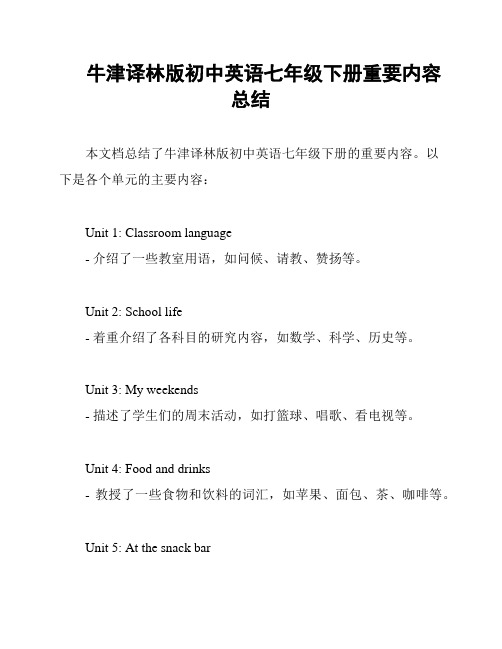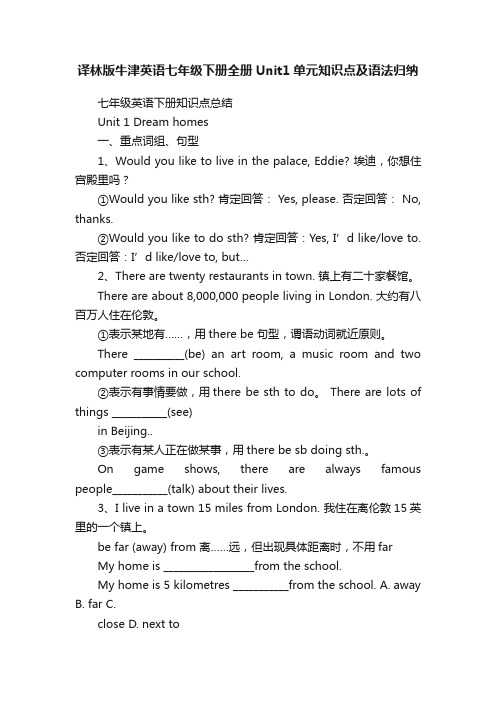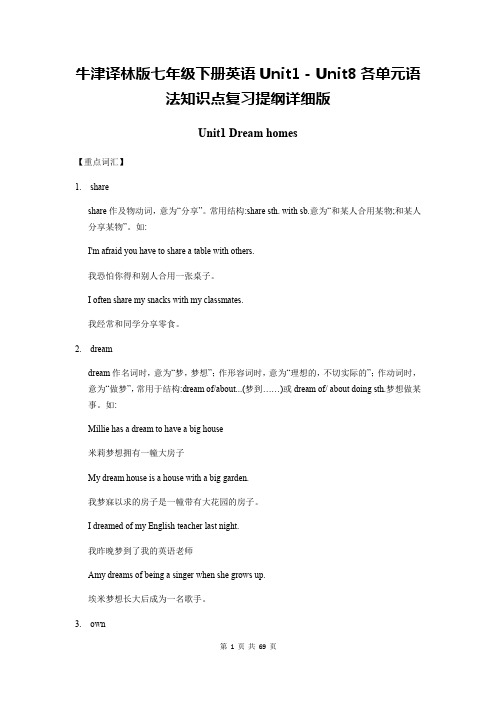七年级下册英语译林版知识点unit1
牛津译林版初中英语七年级下册重要内容总结

牛津译林版初中英语七年级下册重要内容
总结
本文档总结了牛津译林版初中英语七年级下册的重要内容。
以
下是各个单元的主要内容:
Unit 1: Classroom language
- 介绍了一些教室用语,如问候、请教、赞扬等。
Unit 2: School life
- 着重介绍了各科目的研究内容,如数学、科学、历史等。
Unit 3: My weekends
- 描述了学生们的周末活动,如打篮球、唱歌、看电视等。
Unit 4: Food and drinks
- 教授了一些食物和饮料的词汇,如苹果、面包、茶、咖啡等。
Unit 5: At the snack bar
- 研究了在小吃店点餐的常用句型,如“What would you like?”、“Here you are.”等。
Unit 6: Festivals and celebrations
- 介绍了一些重要的节日和庆祝活动,如春节、圣诞节、生日等。
Unit 7: Hobbies
- 研究了各种爱好和运动,如阅读、游泳、踢足球等。
Unit 8: At the zoo
- 通过描述动物的外貌和生活性,使学生了解不同的动物种类。
Unit 9: My body and health
- 关注了身体部位和健康问题,如头、肚子、感冒、发烧等。
Unit 10: My family
- 描述了家庭成员的关系和工作,如爸爸、妈妈、姐姐、弟弟等。
这些是牛津译林版初中英语七年级下册的重要内容总结。
希望能对您有所帮助!。
译林版牛津英语七年级下册全册Unit1单元知识点及语法归纳

译林版牛津英语七年级下册全册Unit1单元知识点及语法归纳七年级英语下册知识点总结Unit 1 Dream homes一、重点词组、句型1、Would you like to live in the palace, Eddie? 埃迪,你想住宫殿里吗?①Would you like sth? 肯定回答: Yes, please. 否定回答: No, thanks.②Would you like to do sth? 肯定回答:Yes, I’d like/love to. 否定回答:I’d like/love to, but…2、There are twenty restaurants in town. 镇上有二十家餐馆。
There are about 8,000,000 people living in London. 大约有八百万人住在伦敦。
①表示某地有……,用there be 句型,谓语动词就近原则。
There __________(be) an art room, a music room and two computer rooms in our school.②表示有事情要做,用there be sth to do。
There are lots of things ___________(see)in Beijing..③表示有某人正在做某事,用there be sb doing sth.。
On game shows, there are always famous people___________(talk) about their lives.3、I live in a town 15 miles from London. 我住在离伦敦15英里的一个镇上。
be far (away) from 离……远,但出现具体距离时,不用farMy home is __________________from the school.My home is 5 kilometres ___________from the school. A. away B. far C.close D. next to4. have fun with sb./sth. 和某人/某物玩得开心have fun doing sth. 做某事很开心have(has/had) fun= have(has/had) a good time= enjoy(enjoyed) onself(myself/yourself/youselves……)5、I also have a bedroom of my own. =I also have my own bedroom. 我也有自己的房间。
译林版英语七年级下册第一单元知识点word版

牛津译林版英语——七年级下册第一单元知识点Unit 1 Dream homes教材知识盘点Comic strip1.Dream homes 梦想中的家园【知识点1】dream 作定语修饰名词,此处是名词dream 作定语修饰homes ,表示“梦想中的家园”例如:My dream is to be a teacher.我的理想是当一名教师。
【知识拓展】此类短语的复数形式:一般是主体词(后一个名词)变复数,但前一个名词为man/woman 时,前后两个名词都要用复数。
① My uncle has a big farm with many apple trees.我叔叔拥有一个有许多苹果树的大农场。
②A woman nurse -------women nurses 女护士③They are men doctors.他们是男医生。
2. Would you like to live in a palace, Eddie? 埃迪,你想住在宫殿里吗?【知识点2】Would you like to do sth?你愿意/想做某事吗?Would you like to do sth? 是用来提建议的常用句型,意思为:你愿意/想做某事吗?其肯定回答通常用Yes, I’d like/love to. 或者Yes, I’d like that.还可用OK 或者All right 等来回答。
否定回答常用No, thanks.或者I’d like to ,but……等。
例如:①—Would you like to go camping with me tonight?—Yes , I’d like/love to.(肯定回答)是的,我愿意去。
② —Would you like to play football with me?你愿意和我一起踢足球吗?---I’d like to ,but I have too much homework to do.(否定回答)我想去,但我有太多的作业要做。
译林版七年级下册英语

单词。
Unit 1。
rescue v. 拯救;营救。
player n. 游戏者;玩家。
village n. 村庄;乡村。
except prep. 除;除了。
Italy n. 意大利。
rice n. 米;米饭。
photo n. 照片。
Moscow n. 莫斯科。
factory n. 工厂。
Unit 2。
strange adj. 奇怪的;陌生的。
keyboard n. 键盘。
loud adj. 响亮的;嘈杂的。
rug n. 小地毯。
honest adj. 诚实的。
organized adj. 有条理的;有组织的。
suitcase n. 手提行李箱。
fireplace n. 壁炉。
mirror n. 镜子。
Unit 3。
wealth n. 财富;财产。
exchange v. 交换;交流。
mainly adv. 主要地;大体上。
capital n. 首都。
cartoon n. 动画片;卡通片。
tourist n. 旅行者;观光客。
meal n. 一餐;一顿饭。
climate n. 气候;气候条件。
Unit 4。
usual adj. 通常的;平常的。
except for 除…以外。
accident n. 事故;意外的事。
package n. 包裹;一包。
already adv. 已经。
gallon n. 加仑;八加仑。
top v. 高于;超过。
citizen n. 公民;市民。
Unit 5。
spend v. 花费;度过。
unhappy adj. 不快乐的;不幸的。
terrible adj. 可怕的;糟糕的。
star n. 星星;明星。
tablecloth n. 桌布;桌巾。
hide v. 藏;躲藏。
doorway n. 门口;门厅。
conclusion n. 结论;推论。
Unit 6。
depending on 取决于。
correctly adv. 正确地;准确地。
improve v. 改善;增进。
weak adj. 虚弱的;无力的。
七年级下册译林版英语unit1知识点

七年级下册译林版英语unit1知识点Unit 1 Knowledge Points in Grade 7 of Translated Forest English TextbookAs the new term starts, students in Grade 7 of Translated Forest English Textbook are going to learn Unit 1. This unit includes several knowledge points that students need to learn and understand. In this article, we will discuss these knowledge points one by one.1. Expressing likes and dislikesIn this unit, students will learn how to express their likes and dislikes in English. They will master the usage of the verb "like" and "dislike" and be able to use them to communicate their preferences. For example, "I like pizza" or "I dislike broccoli".2. Talking about frequencyStudents will also learn how to talk about the frequency of their activities. They will be introduced to adverbs of frequency such as "always", "often", "sometimes", "rarely", and "never". For example, "I always eat breakfast" or "I never ride a bike to school".3. Count and non-count nounsCount and non-count nouns are important for English grammar. In this unit, students will learn how to distinguish between count and non-count nouns and use them correctly. They will also learn how to use words like "some" or "any" with these nouns. For example, "I need some salt" or "I don't have any friends".4. Talking about hobbiesHobbies are common topics in English conversation. In this unit, students will learn how to talk about their hobbies and the activities they enjoy doing in their free time. They will use the present simple tense to describe their hobbies. For example, "I play basketball every weekend" or "I love reading books at home".5. Making invitationsMaking invitations is an important skill in English communication. Students will learn how to make invitations using the verb "let's". Forexample, "Let's go to the park together" or "Let's watch a movie tonight".6. Talking about schedulesIn this unit, students will learn how to talk about schedules and events using the present simple tense. They will be able to talk about routines and make plans. For example, "I have English class every Tuesday" or "I am going to the beach next weekend".In conclusion, Unit 1 of Translated Forest English Textbook for Grade 7 includes several important knowledge points. Students will learn how to express likes and dislikes, talk about frequency, distinguish between count and non-count nouns, talk about hobbies, make invitations, and talk about schedules. These knowledge points are essential for students to communicate effectively in English.。
七年级下册英语译林版unit1知识点

七年级下册英语译林版unit1知识点七年级下册英语译林版Unit 1知识点Unit 1是学习七年级下册英语译林版的第一个单元,是一个非常重要的单元。
本文将介绍该单元包括的知识点,以便同学们能够更好地掌握这个单元。
一、语法1. 现在进行时现在进行时是指现在正在发生的事情。
它用“be+现在分词”的形式来表达。
例如:I am listening to music. (我正在听音乐。
)She is playing basketball. (她正在打篮球。
)2. 表示计划和打算的“be going to”“be going to”是表示计划和打算的一种语法形式。
例如:I am going to study hard. (我打算好好学习。
)They are going to travel to Japan next month. (他们下个月将去日本旅游。
)3. 名词所有格名词所有格表示所属关系,一般在名词后面加上“’s”或“’”。
例如:This is my sister’s book. (这是我妹妹的书。
)The boy’s hat is blue. (这个男孩的帽子是蓝色的。
)二、生词本单元生词如下:1. twice (adv.) 两次2. go (v.) 去3. grandmother (n.) 祖母4. grandfather (n.) 祖父5. uncle (n.) 叔叔6. aunt (n.) 阿姨7. cousin (n.) 堂兄弟姐妹8. seem (v.) 似乎9. must (v.) 必须三、知识点详解1. 四会单词本单元的四会单词包括“twice”和“go”。
学生们应该熟练掌握这些单词的含义、用法以及拼写。
2. 家庭成员本单元重点介绍了家庭成员的词汇,比如“grandmother”、“grandfather”、“uncle”、“aunt”和“cousin”。
学生们应该能够熟练掌握这些词汇并且能够正确地运用它们。
七年级下册英语unit1知识点归纳译林

七年级下册英语unit1知识点归纳译林七年级下册英语Unit1知识点归纳——译林Unit1是英语学习中的重要阶段,本篇文章将对该单元的知识点进行归纳和总结,帮助大家更好地掌握这个单元的内容。
一、重点词汇1. plane:飞机2. engineer:工程师3. singer:歌手4. pilot:飞行员5. coach:教练员6. scientist:科学家7. basketball player:篮球运动员8. fireman:消防员9. businessman:商人10. lawyer:律师二、重点句型1. What does he/she do?:他/她是干什么的?2. What do you want to be when you grow up?:长大后你想成为什么?3. I want to be a/an…:我想成为一个……4. She/he is a/an…:她/他是一个……5. Why do you want to be a/an…?:为什么你想成为一个……三、语法重点1. 一般现在时一般现在时常用于表达客观事实、经常性的动作或状态。
例如:My father is a doctor.(我的父亲是一名医生。
)2. 疑问句和否定句疑问句和否定句构成方式:1)疑问句:+ do/does + 主语 + 动词原形.例如:Do you like basketball?(你喜欢篮球吗?)2)否定句:主语 + do/does + not + 动词原形.例如:I do not like swimming.(我不喜欢游泳。
)四、练习题1. What does your mother do?2. What do you want to be when you grow up?3. She is a famous singer.(改成一般疑问句并用肯定回答。
)4. I do not like playing football.(改成肯定句。
牛津译林版七年级下册英语Unit1-Unit8各单元语法知识点复习提纲详细版(全面,实用!)

牛津译林版七年级下册英语Unit1-Unit8各单元语法知识点复习提纲详细版Unit1 Dream homes【重点词汇】1. shareshare作及物动词,意为“分享”。
常用结构:share sth. with sb.意为“和某人合用某物;和某人分享某物”。
如:I'm afraid you have to share a table with others.我恐怕你得和别人合用一张桌子。
I often share my snacks with my classmates.我经常和同学分享零食。
2. dreamdream作名词时,意为“梦,梦想”;作形容词时,意为“理想的,不切实际的”;作动词时,意为“做梦”,常用于结构:dream of/about...(梦到……)或dream of/ about doing sth.梦想做某事。
如:Millie has a dream to have a big house米莉梦想拥有一幢大房子My dream house is a house with a big garden.我梦寐以求的房子是一幢带有大花园的房子。
I dreamed of my English teacher last night.我昨晚梦到了我的英语老师Amy dreams of being a singer when she grows up.埃米梦想长大后成为一名歌手。
3. ownown作形容词.意为“自己的,属于自己的”,常和形容词性物主代词连用,构成短语of one's own,表示“属于某人自己的”,on one's own = alone,意为“独自地”。
own作动词时,表示“拥有”。
如:I have my own computer我有属于我自己的电脑。
That's a car of her own.那是她自己的汽车。
He lives on his own.他一个人生活。
- 1、下载文档前请自行甄别文档内容的完整性,平台不提供额外的编辑、内容补充、找答案等附加服务。
- 2、"仅部分预览"的文档,不可在线预览部分如存在完整性等问题,可反馈申请退款(可完整预览的文档不适用该条件!)。
- 3、如文档侵犯您的权益,请联系客服反馈,我们会尽快为您处理(人工客服工作时间:9:00-18:30)。
七年级下册英语译林版知识点unit1 Unit 1:Meeting New Friends
七年级下册英语译林版知识点
本单元主要讲述如何认识新朋友,介绍和询问他们的基本信息以及简单的问候语。
在学习过程中,不仅能提高英语口语表达能力,还能够帮助理解英语中的常用表达。
一、认识新朋友
1. Hey, I’m… 嘿,我是…
2. Nice to meet you. 很高兴见到你。
3. What’s your name? 你叫什么名字?
4. My name is… 我的名字是…
5. Where are you from? 你来自哪里?
6. I’m from… 我来自…
二、介绍自己
1. I’m in Grade Seven. 我在七年级。
2. I’m twelve years old. 我十二岁。
3. I like… 我喜欢…
4. My hobby is… 我的爱好是…
5. I can speak… 我会说…
6. I want to be… 我想要成为…
三、问候语
1. How are you? 你好吗?
2. I’m fine, thank you. 我很好,谢谢。
3. How’s it going? 近来如何?
4. Not bad. 不错。
5. Good morning/afternoon/evening. 早上/下午/晚上好。
四、练习
1. Dialogue 1
A: Hey, I’m Sarah. What’s your name?
B: Hi, I’m Jack. Nice to meet you.
A: Nice to meet you, too. Where are you from? B: I’m from Canada. How about you?
A: I’m from the United States.
B: What’s your hobby?
A: I like playing tennis. How about you?
B: I like dancing.
2. Dialogue 2
A: How are you, Karen?
B: I’m fine, thank you. And you?
A: I’m doing pretty well. How’s schoo l going?
B: It’s going all right. How about you?
A: Same here. Anyway, I’ve got to go now. See you later.
B: See you.
以上是本单元的知识点概括,通过学习这些基础知识,可以轻松地认识新朋友并与他们进行简单的交谈。
最后,希望大家能够在学习英语的过程中不断提高自己的口语表达能力,更好地应对实际生活中的各种场景。
